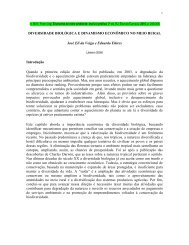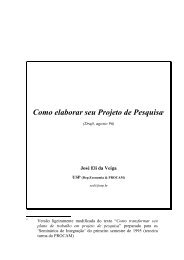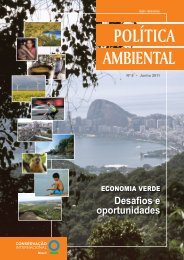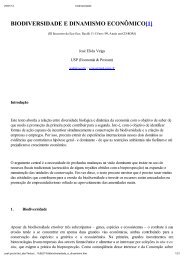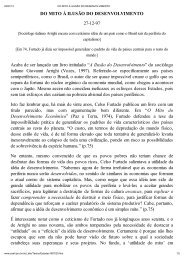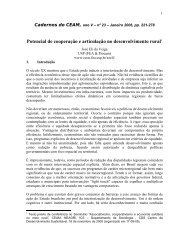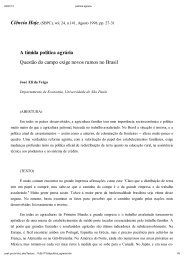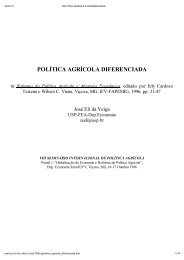sustainable development 20 years on from the ... - José Eli da Veiga
sustainable development 20 years on from the ... - José Eli da Veiga
sustainable development 20 years on from the ... - José Eli da Veiga
Create successful ePaper yourself
Turn your PDF publications into a flip-book with our unique Google optimized e-Paper software.
239<br />
(f)<br />
Send proper signals to essential sectors, especially energy, in order to encourage more<br />
<str<strong>on</strong>g>sustainable</str<strong>on</strong>g> patterns of producti<strong>on</strong> and c<strong>on</strong>sumpti<strong>on</strong><br />
The measures in <strong>the</strong> energy sector should include:<br />
(i) Overhauling policies <strong>on</strong> subsidizati<strong>on</strong> and re-directing expenditure in order to target <strong>the</strong><br />
lowest-income groups and <strong>the</strong> disadvantaged more effectively with initiatives for increasing<br />
<strong>the</strong>ir access to high-quality sources of energy and steering <strong>the</strong>m in <strong>the</strong> directi<strong>on</strong> of less<br />
polluting sources. <strong>Eli</strong>minating, in particular, untargeted fuel subsidies, which are highly<br />
regressive, do not promote rati<strong>on</strong>al energy use, c<strong>on</strong>tribute to global warming and to polluti<strong>on</strong><br />
at <strong>the</strong> local level and encourage dependent patterns of fossil fuel producti<strong>on</strong> and<br />
c<strong>on</strong>sumpti<strong>on</strong>. This dependence can, in turn, give rise to ec<strong>on</strong>omic risks in countries<br />
importing hydrocarb<strong>on</strong>s and hydrocarb<strong>on</strong>-intensive products.<br />
(ii) Promoting energy efficiency by removing barriers for energy service companies working to<br />
coordinate energy-efficient projects for large numbers of users/c<strong>on</strong>sumers (for example,<br />
small- and medium-sized enterprises).<br />
(iii) Implementing <strong>on</strong>going, <str<strong>on</strong>g>sustainable</str<strong>on</strong>g> public-sector procurement programmes that reward<br />
energy efficiency and reducti<strong>on</strong>s in emissi<strong>on</strong>s of pollutants such as greenhouse gases.<br />
(iv) Developing a framework that will promote reducti<strong>on</strong>s in carb<strong>on</strong> footprints through efficient<br />
energy use and encouraging <strong>the</strong> use of renewable energy sources by removing existing<br />
ec<strong>on</strong>omic, regulatory, cultural, social, technical and financial barriers.<br />
Guideline 4<br />
Improve <strong>the</strong> coordinati<strong>on</strong> and c<strong>on</strong>sistency of public acti<strong>on</strong> in relati<strong>on</strong><br />
to <str<strong>on</strong>g>sustainable</str<strong>on</strong>g> <str<strong>on</strong>g>development</str<strong>on</strong>g> policies<br />
Over <strong>the</strong> last two decades it has become clear that <str<strong>on</strong>g>sustainable</str<strong>on</strong>g> <str<strong>on</strong>g>development</str<strong>on</strong>g> cannot be achieved through<br />
<strong>the</strong> acti<strong>on</strong>s of envir<strong>on</strong>mental instituti<strong>on</strong>s al<strong>on</strong>e. Policy decisi<strong>on</strong>s must be c<strong>on</strong>sistent and different<br />
government departments should not send c<strong>on</strong>tradictory messages. On occasi<strong>on</strong>, major envir<strong>on</strong>mental<br />
protecti<strong>on</strong> efforts can be negated by o<strong>the</strong>r parallel ec<strong>on</strong>omic incentives. For example, fossil fuel subsidies<br />
—which are used in several countries in <strong>the</strong> regi<strong>on</strong> to regulate inflati<strong>on</strong> or to ensure access to energy—<br />
can cancel out investment in and envir<strong>on</strong>mental and <str<strong>on</strong>g>development</str<strong>on</strong>g> policies <strong>on</strong> low-carb<strong>on</strong> soluti<strong>on</strong>s.<br />
Incentives to promote <str<strong>on</strong>g>sustainable</str<strong>on</strong>g> <str<strong>on</strong>g>development</str<strong>on</strong>g> in public acti<strong>on</strong> can be effectively incorporated<br />
through practical acti<strong>on</strong>, though this is a l<strong>on</strong>g and complex process involving various sectors and levels of<br />
government and requiring <strong>the</strong> alignment of public policies under <strong>on</strong>e guiding strategic visi<strong>on</strong>.<br />
Sustainability, like o<strong>the</strong>r key areas of <str<strong>on</strong>g>development</str<strong>on</strong>g> in Latin America and <strong>the</strong> Caribbean, will not come<br />
about as a result of inertia or market forces. The market and private-sector agents play an essential role,<br />
but <strong>the</strong>y need a strategic framework in <strong>the</strong> form of clear legal and ec<strong>on</strong>omic instruments, defined by <strong>the</strong><br />
State in a democratic fashi<strong>on</strong> with <strong>the</strong> participati<strong>on</strong> of society. In order to achieve <str<strong>on</strong>g>sustainable</str<strong>on</strong>g><br />
<str<strong>on</strong>g>development</str<strong>on</strong>g> in Latin America and <strong>the</strong> Caribbean, <strong>the</strong> State’s capacity to play a guiding role must be<br />
boosted so that it can lead <strong>the</strong> way am<strong>on</strong>g <strong>the</strong> network of public and private agents involved in<br />
<str<strong>on</strong>g>development</str<strong>on</strong>g> (ECLAC, <str<strong>on</strong>g>20</str<strong>on</strong>g>10). A fiscal and social pact for <str<strong>on</strong>g>sustainable</str<strong>on</strong>g> <str<strong>on</strong>g>development</str<strong>on</strong>g> (see guideline 1) can<br />
be reached <strong>on</strong>ly by carrying out a thorough exercise in coordinati<strong>on</strong> and coherence in public acti<strong>on</strong> and<br />
encouraging participati<strong>on</strong> at all levels.



